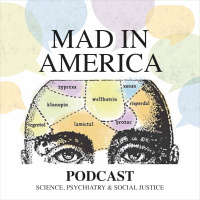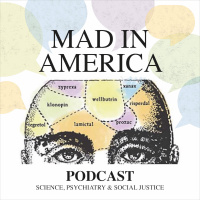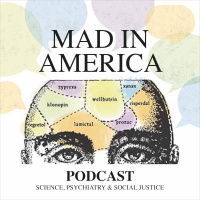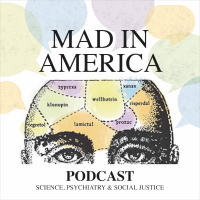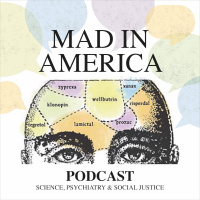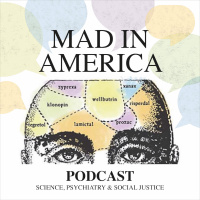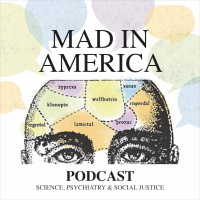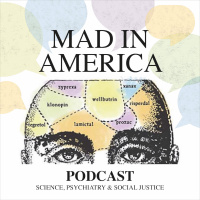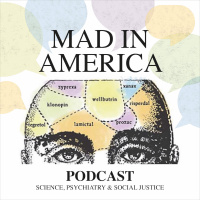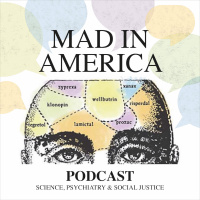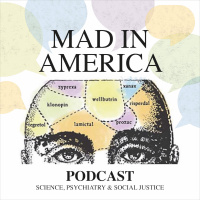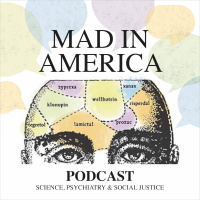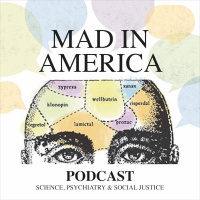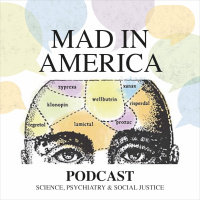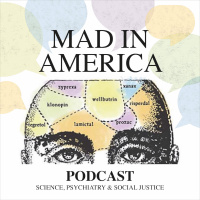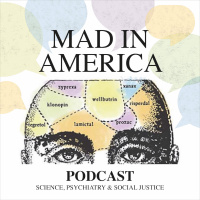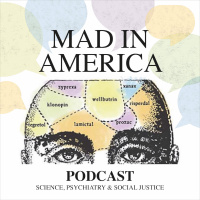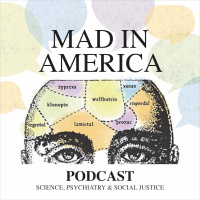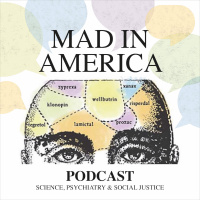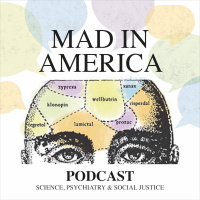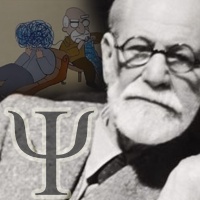Sinopse
Welcome to the Mad in America podcast, a new weekly discussion that searches for the truth about psychiatric prescription drugs and mental health care worldwide.This podcast is part of Mad in Americas mission to serve as a catalyst for rethinking psychiatric care. We believe that the current drug-based paradigm of care has failed our society and that scientific research, as well as the lived experience of those who have been diagnosed with a psychiatric disorder, calls for profound change. On the podcast over the coming weeks, we will have interviews with experts and those with lived experience of the psychiatric system. Thank you for joining us as we discuss the many issues around rethinking psychiatric care around the world.For more information visit madinamerica.comTo contact us email [email protected]
Episódios
-
Alita Taylor - Open Dialogue - Making Meaning
16/02/2019 Duração: 31minThis week on MIA Radio, we turn our attention to Open Dialogue and we chat with psychotherapist and Open Dialogue trainer Alita Taylor. Alita is a licensed Marriage & Family Therapist, trainer and facilitator based in Tacoma, Washington USA. Her passion is working from a community-based, non-expert, need-adapted Open Dialogue perspective, which utilizes social networks, family, and co-facilitation with other professionals. In this recent blog, Alita shares why Open Dialogue ‘cannot be taught, but needs a teacher‘. Love Is In the Air… I am in love. I’m in love with this way of working. And I won’t stop. Open Dialogue Washington began in 2018 upon my graduation/commencement from Jaakko Seikkula’s dialogic approaches to couple and family therapy trainer/supervisor training, in collaboration with Dialogic Partners and the University of Jyväskylä. In 2016, I embarked to partake in the best training course I had ever experienced as a family therapist. The embodiment I experienced working with my Open Dialogue c
-
Jim van Os - Towards Resilience and Possibilities and Away from Diseases and Symptoms
26/01/2019 Duração: 58minThis week on MIA Radio, we interview Professor Jim van Os. Professor van Os is Chairman of the Division of Neuroscience at Utrecht University Medical Centre, Utrecht, The Netherlands, and Visiting Professor of Psychiatric Epidemiology at King’s College, Institute of Psychiatry in London. He trained in Psychiatry in Casablanca, Bordeaux and the Institute of Psychiatry and the Maudsley Royal Hospital in London. We last spoke with Jim for the podcast in August 2017 and this time we focus on a recent paper written by Jim and co-authors that was published in the journal World Psychiatry in January 2019. The paper is entitled ‘The diagnosis evidence-based group-level symptom-reduction model as organizing principle for mental health care. Time for change?‘ In this episode we discuss: What the diagnosis evidence-based group-level symptom-reduction model is and how it currently informs mainstream mental healthcare. How mental health funding and mental health professional partners work together to monitor and assess t
-
Darcia Narvaez - Reclaiming Humanity
21/12/2018 Duração: 01h04minIn this second interview in our Science and Pseudoscience of Mental Health series, Dr. Sharna Olfman interviews Dr. Darcia Narvaez. In 1955, Erich Fromm published a book called The Sane Society. The basic premise is that cultures that support our existential needs for love, community, autonomy, creative expression, purpose, meaning, and communion with nature, enable us to become fully actualized, sane human, beings. Cultures that fail to do so, engender mental illness. Darcia Narvaez,1 a Professor of Psychology at the University of Notre Dame, has taken up the mantle of Fromm’s quest to identify and promote sane cultural practices that foster mental health. A prolific multidisciplinary scholar, her recent books include Neurobiology and the Development of Human Morality: Evolution, Culture and Wisdom (2014) and Basic Needs, Wellbeing and Morality: Fulfilling Human Potential (2018). To read more about Dr. Narvaez' work, visit this link: https://www.madinamerica.com/2018/12/reclaiming-humanity-dawn/ © Mad in Am
-
Will Davies - The Happiness Industry
17/11/2018 Duração: 46minWhen we discuss the issue of forced treatment, coercive mental health interventions like involuntary commitment, forced drugging, and electroconvulsive therapy usually come to mind. But force and coercion can be much more subtle. Many researchers and thought leaders have argued that our society mandates us to be happy and perform well-being at all times through cultural norms, media depictions, and workplace and school regulations. This week on MIA Radio we interview Will Davies, Reader in Political Economy at Goldsmiths University of London, and author of The Happiness Industry, a book that explores the rapidly growing culture of mandated happiness and well-being surveillance. In this interview, we discuss the increasing pressure people face to be happy and think positive, and how this pressure serves the interests of the corporate elite and the State. In this episode we discuss: What the “happiness industry” is and the history of its development How the notion that happiness can be quantified or measured,
-
Sandy Steingard - Anatomy of a Psychiatrist
10/11/2018 Duração: 53minThis week on MIA Radio, we interview Dr. Sandy Steingard. Dr. Steingard is Medical Director at Howard Center, a community mental health center where she has worked for the past 21 years. She is also Clinical Associate Professor of Psychiatry at the College of Medicine of the University of Vermont. For more than 25 years, her clinical practice has primarily included patients who have experienced psychotic states. Dr. Steingard serves as Board Chair of the Foundation for Excellence in Mental Health Care. She was named to Best Doctors in America in 2003 and writes regularly for Mad in America. She is editor of the book Critical Psychiatry, Controversies and Clinical Implications due in 2019. In this episode we discuss: What led Sandy to her career in psychiatry and her particular interest in the critical aspects of psychiatry and psychology. That Sandy’s initial interest was in biomedical explanations of psychotic experiences. How, in the late 80s, the advent of new antipsychotic drugs caused an initial excitem
-
Derek Summerfield - Moving Global Mental Health "Outside Our Heads"
27/10/2018 Duração: 57minThis week, MIA Radio presents the fourth in a series of interviews on the topic of the global “mental health” movement.” This series is being developed through a UMASS Boston initiative supported by a grant from the Open Society Foundation. The interviews are being led by UMASS PhD students who also comprise the Mad in America research news team. Over the past three weeks, we have published interviews with many of the leading voices in this debate. Immediately following the release of the report and the beginning of the Summit, on World Mental Health Day, psychiatric epidemiologist, Dr. Melissa Raven, was on the MIA podcast. She questioned the evidence base of the movement, pointing to statistical issues in the prevalence rates of mental disorders internationally, and called for a focus on addressing barriers to health rather than on individualized treatment. Mental health service-user activists, Jhilmil Breckinridge, of the Bhor Foundation in India, and Dr. Bhargavi Davar, of Transforming Communities for Inc
-
China Mills - Global Mental Health - Coloniality, Technology and Medicalization
24/10/2018 Duração: 56minToday, we bring you the third in our series of podcasts on the topic of the global mental health movement. Part one of the series featured Dr Melissa Raven and part two featured Jhilmil Breckenridge and Dr Bhargavi Davar. These interviews are led by our Mad in America research news team. In this episode, we interview Dr China Mills. China participated in organizing the open letter in response to The Lancet Commission on Global Mental Health and Sustainable Development. In this interview, China shares her concerns and reactions to the Lancet’s proposal, elaborating on deeper issues related to the framing of global mental health as a “burden” and the underlying implications of coloniality, technology, and medicalization. In addition, China tells us about her insider perspectives after attending the Global Mental Health Ministerial Summit hosted by the UK government. In her recent piece for Mad in Asia about the summit, she writes: “It was ironic to listen to a range of UK Government minsters talk about the i
-
Jhilmil Breckenridge and Bhargavi Davar - Global Mental Health - An Old System Wearing New Clothes
20/10/2018 Duração: 01h07minToday, we bring you the second in our series of podcasts on the topic of the global mental health movement. These interviews are led by our Mad in America research news team. On October 9th and 10th, 2018, World Mental Health Day, the UK government hosted a Global Mental Health Ministerial Summit with the intention of laying out a course of action to implement mental health policies globally. In the same week, The Lancet Commission on Global Mental Health and Sustainable Development published a report outlining a proposal for “scaling up” mental health care globally. In response, a coalition of mental health activists and service-users have organized an open letter detailing their concerns with the summit and report. The response has attracted the support of policy-makers, psychologists, psychiatrists, and researchers. In our last episode, we were joined by Dr Melissa Raven, a critical psychologist and epidemiologist, who discussed problems with the scientific evidence base used by the global mental health mo
-
Melissa Raven - The Global Mental Health Movement - Cause for Concern
10/10/2018 Duração: 31minThis week, we present the first in a series of interviews on the topic of the global ‘mental health’ movement. These interviews will be led by our Mad in America research news team and today’s interview is hosted by our lead research news editor, Justin Karter. In this episode, Justin interviews Dr Melissa Raven, who is a psychiatric epidemiologist, policy analyst and postdoctoral research fellow in the Critical and Ethical Mental Health research group at the University of Adelaide, South Australia. Originally qualified as a clinical psychologist, she then worked as a lecturer and researcher in public health and primary health care. Her current mental health research and advocacy is informed by a strong social determinants perspective and a strong critical orientation, which she applies to a range of topics, including suicide prevention, workplace mental health, (over)diagnosis, (inappropriate) prescribing, and conflicts of interest in mental health and the broader health/welfare arena. On October 10th, 2018,
-
Zach Bush - Healthy Planet/Healthy Mind
04/10/2018 Duração: 58minSharna Olfman Ph.D interviews Zach Bush MD One of the few triple board-certified physicians in the country, with expertise in Internal Medicine, Endocrinology and Metabolism, and Hospice/Palliative care, Dr. Zach Bush abandoned his prestigious academic career in cancer research, and his conventional medical practice a decade ago, after coming to terms with the fact that not only were his pharmaceutically based research and treatment protocols ineffectual; they were making his patients sicker. He then opened a clinic in the middle of a food desert in rural Virginia, where he swapped out pharmaceutical interventions for the medicinal properties of plants. Now based in Charlottesville, Dr. Bush has assembled an outstanding group of scientists and clinicians who are at the forefront of research on the microbiome and epigenetics. He has developed an impactful approach to healthcare which directly challenges ‘big farming, ‘big pharma’ and conventional medicine. https://www.madinamerica.com/2018/10/healthy-plan
-
John Read and Sue Cunliffe - The 57th Maudsley Debate - This House Believes that ECT has no Place in Modern Medicine
01/10/2018 Duração: 01h05minThis week on MIA Radio we turn our attention to Electroconvulsive Therapy (ECT) or Electroshock as it’s known in the US. On Wednesday, September 19th, this emotive and controversial intervention was discussed at the 57th Maudsley debate, held at Kings College London. The motion proposed was: “This house believes that ECT has no place in modern medicine”. Supporting the motion were Professor John Read who has undertaken several scientific reviews of the literature supporting the use of ECT and Dr Sue Cunliffe. Dr Cunliffe was a paediatrician until she herself underwent ECT, after which she became cognitively impaired and found herself unable to continue working. She now campaigns for the risks of ECT to be made more explicit and to directly address the professional denial of the damage that ECT can cause. Speaking against the motion were Professor Declan McLoughlin and Dr Sameer Jauhar. Both John and Sue took time out to talk about the debate and the wider issues surrounding ECT. Professor Read kindly shared h
-
Conflicts of Interest Questioned in Review of Prescribed Drug Dependence
21/08/2018 Duração: 38minThis week on MIA Radio, we discuss the UK Royal College of Psychiatrists representation on a Government-led review of Prescribed Drug Dependence. Professor Sami Timimi, a fellow of the Royal College of Psychiatry, and 30 other mental health experts, have formally asked the College to ‘replace Professor David Baldwin as its representative on The Expert Reference Group of Public Health England’s Review of Prescribed Medicines, with an RCPsych member who is not compromised by conflicts of interest with the pharmaceutical industry’. In this podcast, we hear from Professor Timimi, Psychiatrist Peter Gordon and campaigner Stevie Lewis. Both Peter and Stevie are people who have experienced withdrawal effects from antidepressant drugs. Conflicts of Interest Questioned in Royal College of Psychiatry’s Participation in Government-Led Mental Health Medication Review August 17, 2018 From: James Moore, antidepressant withdrawal sufferer, on behalf of the 30 other signatories to today’s letter. London, UK – A fellow of t
-
Julia Rucklidge - Nutrition, Mental Health and TED
28/07/2018 Duração: 37minThis week on MIA Radio we interview Dr Julia Rucklidge. Dr Rucklidge is professor of clinical psychology at the University of Canterbury in New Zealand and she leads the Mental Health and Nutrition Research Group. Originally from Toronto, Canada, Julia completed her PhD at the University of Calgary followed by a post-doctoral fellowship at the Hospital for Sick Children in Toronto. In the last decade, she and her lab have been running clinical trials investigating the role of broad-spectrum micronutrients in the expression of mental illness, specifically ADHD, mood disorders, anxiety and stress. Julia has over 100 peer-reviewed publications and book chapters, has been frequently featured in the media and has given invited talks all over the world on her work on nutrition and mental health. We discuss: What led Julia to her interest in nutrition and how it may have a role in responding to mental disorders, particularly Attention Deficit Hyperactivity Disorder (ADHD). Why using the Recommended Dietary Allowanc
-
World Benzodiazepine Awareness Day 2018 - Part 2 - Robert Whitaker
11/07/2018 Duração: 56minThis week on MIA Radio, we present a special episode of the podcast to join in the many events being held for World Benzodiazepine Awareness Day, July 11, 2018. In part 2 of the podcast, we interview Mad in America founder, Robert Whitaker. For many of us, Robert needs no introduction as he is well known for his award-winning book, Anatomy of an Epidemic: Magic Bullets, Psychiatric Drugs, and the Astonishing Rise of Mental Illness in America, which was released in 2010. Robert has been a medical writer at the Albany Times Union newspaper, A journalism fellow at the Massachusetts Institute of Technology and Director of publications at the Harvard Medical School. Besides many papers, journals and articles, Robert has written five books which include Mad In America: Bad Science, Bad Medicine, and The Enduring Mistreatment of the Mentally Ill in 2001, Anatomy of an Epidemic in 2010 and Psychiatry Under The Influence: Institutional Corruption, Social Injury, and Prescriptions for Reform published in 2015. We discu
-
World Benzodiazepine Awareness Day 2018 - Part 1 - Nicole Lamberson, Josef Witt-Doerring, Chris Paige
11/07/2018 Duração: 01h20minThis week on MIA Radio, we present a special episode of the podcast to join in the many events being held for World Benzodiazepine Awareness Day, July 11, 2018. In part 1, we chat with W-BAD Lead Operations Volunteer and Virginia Representative Nicole Lamberson who talks about the events being held for W-BAD. We hear from psychiatrist Dr Josef Witt-Doerring, who talks about a recent paper he co-authored entitled “Online Communities for Drug Withdrawal: What Can We Learn?”. We also hear from therapist and campaigner Chris Paige who discusses his own experiences taking and withdrawing from benzodiazepines. Finally, in part 2 of the interview, we get to chat with Robert Whitaker, science journalist and author of the books Mad in America and Anatomy of an Epidemic. First, I am very fortunate to have had the chance to talk with Nicole Lamberson. Nicole is Lead Operations Volunteer and Virginia Representative for W-BAD and she has kindly taken time out of her busy preparations to talk about how she became involved
-
Peter Groot and Akansha Vaswani - Tapering Strips and Shared Decision-Making
06/07/2018 Duração: 46minOn MIA Radio this week, Akansha Vaswani and Dr Peter Groot discuss Tapering Strips, a novel and practical solution for those who wish to taper gradually from a range of prescription drugs. Akansha is a doctoral candidate at the University of Massachusetts, Boston and her dissertation research will involve interviewing psychiatrists in the US about their experiences helping people stop or reduce their dose of antidepressant medication. Dr Groot is a researcher and geneticist who has led the development of Tapering Strips. In a recent study, published in the journal Psychosis, Dr Groot, together with Jim van Os, reported on the results of their trial which recorded the experiences of people using Tapering Strips. In this episode we discuss: What motivated Peter to be interested in and study the effects of coming off antidepressants drugs. That the observational study reported in Psychosis was based on questionnaires completed by users who had made use of tapering medication (Tapering Strips) to slowly reduce t
-
Sami Timimi and John Read - Latest Developments with The UK Royal College of Psychiatrists
19/06/2018 Duração: 30minThis week on MIA Radio we provide an update on a complaint made to the UK Royal College of Psychiatrists by a group of thirty academics, psychiatrists and people with lived experience. We hear from both Professor Sami Timimi and Professor John Read who discuss recent events including the latest response from the Chief Executive Officer of the College. Relevant Links: Read the latest update on Mad in America Formal Complaint to the UK Royal College of Psychiatrists Royal College Of Psychiatrists Challenged Over Potentially Burying Inconvenient Antidepressant Data Professor John Read: The Royal College of Psychiatrists and Antidepressant Withdrawal UK Royal College Dismisses Complaint © Mad in America 2018
-
Peter Gordon - Addressing the Divide Between the Arts and Medical Sciences
17/05/2018 Duração: 24minThis week, we interview Dr Peter Gordon. Dr Gordon describes himself as a gardener with an interest in medicine. He trained in both medicine and landscape architecture before specialising in psychiatry and now works with older adults in Scotland. In addition, he is an activist and campaigner and has a range of creative interests including filmmaking, photography, writing and poetry. In this interview, we walk about Peter’s own experiences of psychiatric treatment and how we need to address the divide that exists between the arts and the medical sciences. In this episode we discuss: What led Dr Gordon to have combined interests in the arts and the sciences, training both in architecture and medicine. How Peter was interested in the plurality of thinking required for psychiatry as opposed to general medicine. How he feels that his training in both the arts and the sciences led to a more rounded appreciation of why purely biological approach might miss opportunities to help people. How Peter became an activist,
-
Sera Davidow - Intersections Between Sexual Violence and Psychiatric Abuse
12/05/2018 Duração: 39minThis week on MIA Radio we interview Sera Davidow, a psychiatric survivor and prolific activist for the human rights of people labeled mentally ill. Sera serves as the Director of the Western Massachusetts Recovery Learning Community and is a founding member of the Hearing Voices USA Board of Directors. Through her work, she has gained a range of experiences including starting up a peer respite, opening resource centers, and producing educational materials on non-coercive, non-pathologizing alternatives to the traditional mental health system. Sera is a regular blogger for Mad in America and has written extensively on the topics of forced treatment and sexual violence. In this interview, we discuss the parallels and intersections between coercive psychiatric care and sexual assault. In this episode we discuss: Sera’s lived experience as a psychiatric survivor and survivor of sexual violence. The similarities between sexual violence and forms of psychiatric abuse including forced drugging, forced intubation, f
-
Laura Delano - Connecting people through the Inner Compass Initiative and Withdrawal Project
03/05/2018 Duração: 46minThis week, we interview Laura Delano. Laura is Co-Founder and Executive Director of the Inner Compass Initiative and The Withdrawal Project, which aim to create safe spaces for people to connect and the opportunity to learn about and be guided through the process of getting beyond the mental health system and off psychiatric drugs. The passion she feels for the mission and vision of ICI arises from the fourteen years she spent lost in the mental health system and the journey that she’s been on since 2010, when she chose to leave behind a “mentally ill” identity and the various treatments that came with it, and gradually began to rediscover and reconnect with who she really was and what it means to suffer, struggle, and be human in this world. Since becoming an “ex-patient”, Laura has been writing and speaking about her personal experiences and about the broader social and political issues sitting at the heart of “mental illness” and “mental health”. Since 2011, she has worked both within and beyond the ment

